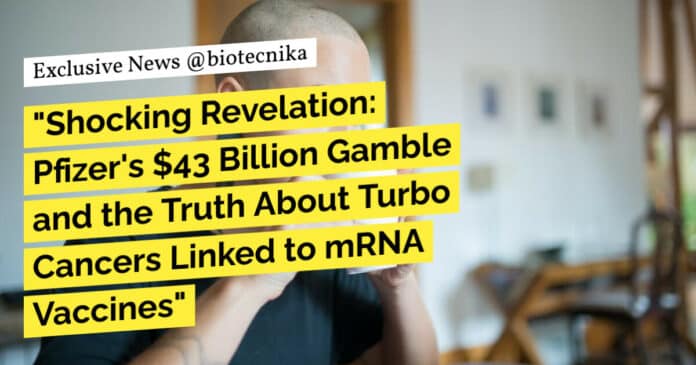
Pfizer’s $43 Billion Bet: Understanding the Rise of ‘Turbo Cancers’
Introduction
In a shocking move, pharmaceutical giant Pfizer has acquired Seagen, a small drug company specializing in treating “turbo cancers.” This $43 billion deal has left many puzzled. Why would Pfizer, already making massive profits from its mRNA vaccine, invest such a significant amount in a cancer treatment company? This article aims to explore the details behind this acquisition and shed light on the rising concerns surrounding turbo cancers caused by mRNA vaccines.
Turbo Cancers Caused by mRNA Vaccines
It is essential to note that Pfizer’s COVID-19 mRNA vaccine, along with Moderna’s, has been linked to an increase in turbo cancers, unlike anything seen before. Medical articles have cited several types of turbo cancers appearing after vaccination, with lymphoma, brain cancers, breast cancer, colon cancer, and lung cancer topping the list. This alarming trend has pushed Pfizer to take action.
Pfizer’s Acquisition of Seagen
By acquiring Seagen, Pfizer becomes the global leader in oncology and gains the ability to treat seven out of the top ten turbo cancers. By making this strategic move, Pfizer not only takes steps to rectify any unintended consequences it may have triggered but also establishes
itself as a key player in managing these complex conditions. Yet, there is a more profound aspect in motion.The Sinister Underlying Details
Pfizer CEO Albert Bourla’s recent media interviews provide crucial insights into the company’s motivations. Bourla projects that turbo cancers will affect 33% of the population in the future, emphasizing that entire families will be impacted. He describes the new cancer treatments as “missiles” that will target “most” turbo cancers. Moreover, he stresses Pfizer’s ability to produce these treatments at an unprecedented scale, comparable to its mRNA vaccine production. This raises some critical questions.
The Future of Turbo Cancers
Why does Pfizer need to produce cancer treatments on an unparalleled scale? What drives the company to bet billions of dollars on the continued exponential growth of turbo cancers worldwide? This acquisition, financially risky for Pfizer, suggests that Bourla and his team possess information about the future that they are not sharing. Seeking Alpha analysis even suggests that it may take Pfizer a decade to break even from this deal. Clearly, there is more to this story.
Understanding the Implications
The implications of Pfizer’s acquisition and vaccination-induced turbo cancers are significant. Governments worldwide are now warning of an explosion in turbo cancers following mass vaccine rollouts. This medical catastrophe demands urgent attention and further investigation. Critics argue that the BioNTech-Pfizer vaccines, sponsored by the Bill & Melinda Gates Foundation, have far-reaching consequences that are increasingly being suppressed in the mainstream media.
Conclusion
The world stands witness to Pfizer’s $43 billion bet on turbo cancers. While the exact motives behind this acquisition remain unclear, the rise of turbo cancers following mRNA vaccinations is a pressing concern that must be addressed. As governments, medical professionals, and the public navigate this complex issue, it becomes crucial to prioritize transparency, thorough investigations, and the well-being of those affected.
Keywords: Pfizer, turbo cancers, mRNA vaccines, cancer treatments, Seagen, oncology, vaccination-induced cancers, Albert Bourla, mass vaccine rollouts, Bill & Melinda Gates Foundation, mainstream media suppression. Pfizer’s $43 Billion Bet: Understanding the Rise of ‘Turbo Cancers’





























